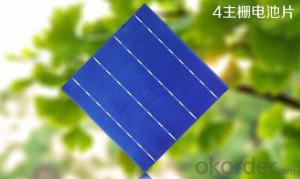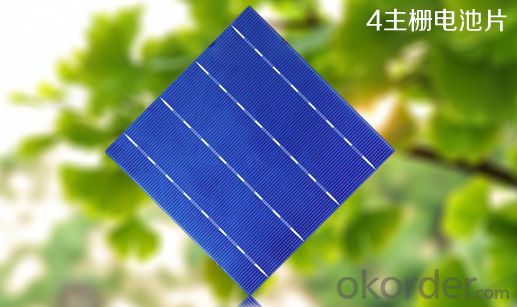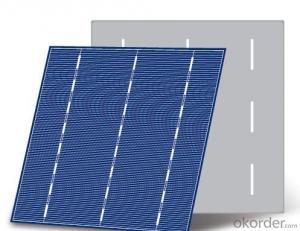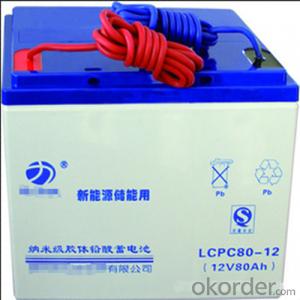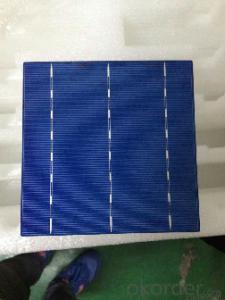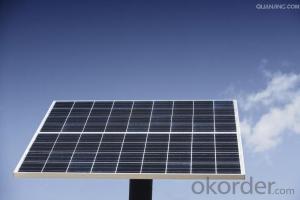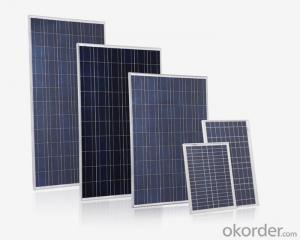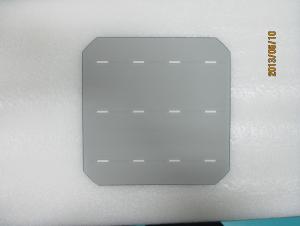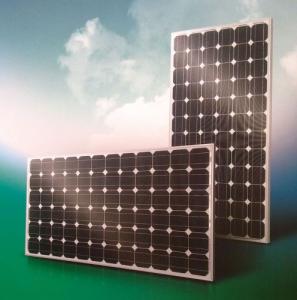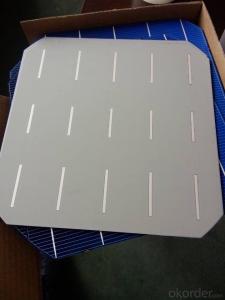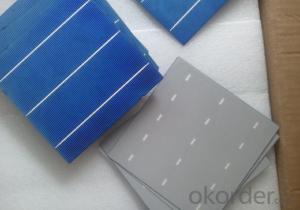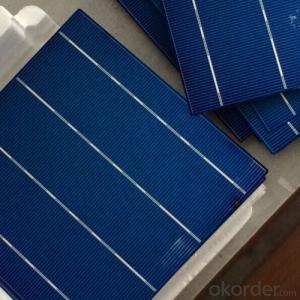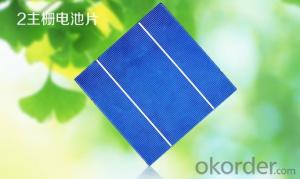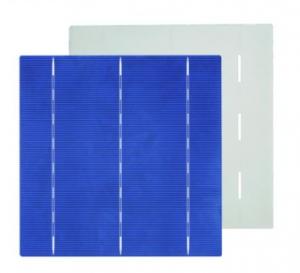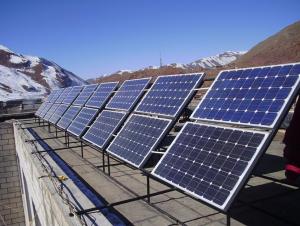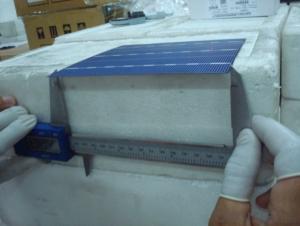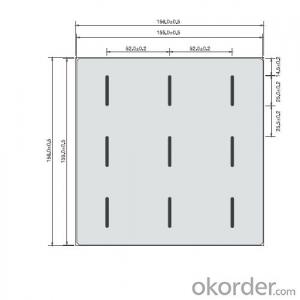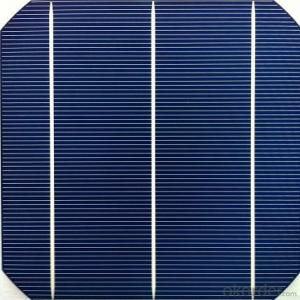High Efficiency PV Poly 4BB Solar Cells
- Loading Port:
- China Main Port
- Payment Terms:
- TT OR LC
- Min Order Qty:
- -
- Supply Capability:
- -
OKorder Service Pledge
Quality Product, Order Online Tracking, Timely Delivery
OKorder Financial Service
Credit Rating, Credit Services, Credit Purchasing
You Might Also Like
our cells special features:
1. High conversion efficiencies resulting in superior power output performance
2.Outstanding power output even in low light or high temperature conditions
3.Optimized design for ease of soldering and lamination
4.Long-term stability,reliability and performance
5.For 156P poly cells with high efficiency in photovoltaic conversion 16.3%-17.5%.
6.Low inverse current, high shunt resistance and high dependability.
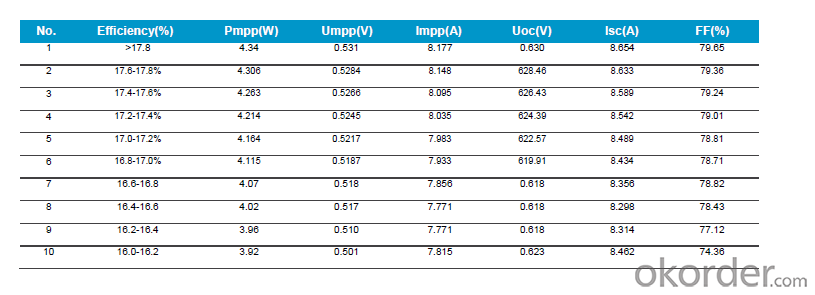
- Q: What is the role of grounding systems in solar cell systems?
- The role of grounding systems in solar cell systems is to provide a safe and efficient pathway for the dissipation of electrical faults and to protect the system from electrical surges and lightning strikes. Grounding systems help minimize the risk of electrical shock, equipment damage, and fire hazards by establishing a connection to the earth, allowing excess electrical energy to be safely redirected and dispersed.
- Q: Can solar cells be used in space heating systems?
- Yes, solar cells can be used in space heating systems. Solar thermal systems can collect and convert sunlight into heat energy, which can then be used to heat spaces. Solar panels can also be used to generate electricity, which can power electric space heaters.
- Q: Can solar cells be used in military vehicles or equipment?
- Yes, solar cells can be used in military vehicles or equipment. They provide a sustainable and efficient power source, reducing the reliance on conventional fuels and batteries. Solar cells can be integrated into various military applications, such as powering communication systems, surveillance equipment, or even charging portable devices. Their use enhances operational efficiency, reduces logistical burdens, and promotes environmental sustainability.
- Q: Can solar cells be used to power irrigation systems?
- Yes, solar cells can be used to power irrigation systems. By converting sunlight into electricity, solar cells can effectively provide a sustainable and renewable energy source to operate irrigation systems, reducing reliance on traditional power sources and promoting eco-friendly practices.
- Q: Can solar cells be used to power outdoor lighting systems?
- Yes, solar cells can be used to power outdoor lighting systems. Solar cells, also known as photovoltaic cells, convert sunlight into electricity. This electricity can be stored in batteries or used directly to power outdoor lighting systems, eliminating the need for traditional electrical wiring or reliance on grid electricity. Solar-powered outdoor lighting systems are efficient, cost-effective, and environmentally friendly solutions for illuminating outdoor spaces.
- Q: How do solar cells perform in different temperature ranges?
- Solar cells generally perform better in cooler temperatures. As the temperature increases, the efficiency of solar cells tends to decrease. However, the actual performance can vary depending on the specific type of solar cell and its design.
- Q: Can solar cells be used in remote sensing applications?
- Yes, solar cells can be used in remote sensing applications. Solar cells can generate electricity from sunlight, which can be used to power sensors, data loggers, and communication devices in remote sensing systems. This allows for continuous and self-sustained operation of these systems in remote and inaccessible areas where traditional power sources are unavailable.
- Q: How are solar cells made?
- Solar cells are typically made using a process called photovoltaic (PV) technology, which involves the assembly of semiconductor materials, usually silicon, into thin layers. The silicon is purified and then shaped into wafers, which are then treated with various dopants to create the desired electrical properties. Metal contacts are added to these wafers, and the cells are encapsulated with protective materials. When sunlight hits the cell, the photons from the sunlight create an electric field across the layers, generating electricity.
- Q: Can solar cells be used in powering e-bikes?
- Yes, solar cells can be used to power e-bikes. Solar panels can be mounted on the bike's frame or incorporated into accessories like panniers or baskets. These panels convert sunlight into electricity, which charges the bike's battery, providing a renewable and sustainable source of power.
- Q: Where can I buy solar cells on sale but still good quality ?
- Good solar cell sellers can get the best solar cells with highest quality as they have very strict quality control from material-during manufacturing-assemble-package; and they also check and test the structure strictly to ensure the whole solar mounting system can work under extreme weather condition;
Send your message to us
High Efficiency PV Poly 4BB Solar Cells
- Loading Port:
- China Main Port
- Payment Terms:
- TT OR LC
- Min Order Qty:
- -
- Supply Capability:
- -
OKorder Service Pledge
Quality Product, Order Online Tracking, Timely Delivery
OKorder Financial Service
Credit Rating, Credit Services, Credit Purchasing
Similar products
Hot products
Hot Searches
Related keywords
